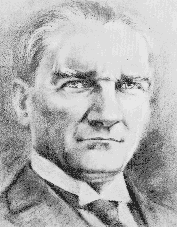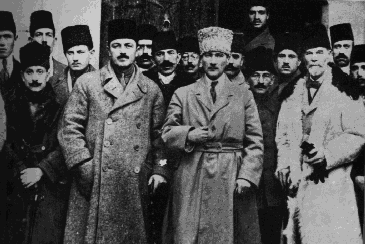

Briefly, he is ...
an exceptional reformer.
the leader of the first struggle given against colonialism and imperialism.
the remarkable promoter of the sense of understanding between peoples and durable peace between the nations of the world.
a leader working all his life for the development of harmony and cooperation between peoples without distinction of color, religion and race.

Kemal Atatürk, b. Mar. 12, 1881, d. Nov. 10, 1938, was the founder and first president of the Turkish Republic (1923-38). Originally named Mustafa Kemal, he joined the YOUNG TURKS as a young military officer and led the extension of the movement to his native Salonika (Thessaloniki). He took an active role in the military coup that overthrew the Ottoman sultan ABD AL-HAMID II in 1909. Kemal was the only Ottoman commander to gain fame during World War I. He defeated the British attempt (1915) to land at Gallipoli and later kept the Turkish army of Syria together as it was pushed back into Anatolia by the British, helped by the Arab Revolt.
Kemal vigorously opposed the Turkish government's decision to surrender (1918) to the Allies and sign the Treaty of Sevres (1920), which gave up large areas of Anatolia to foreign occupation or influence. Because of the government's desire to stimulate resistance despite the foreign occupation of Istanbul, however, he was assigned to supervise demobilization of the remaining troops in Anatolia. He used this authority and his wartime reputation to coalesce rising Turkish resistance forces, organizing a national army based at Ankara. This army ultimately drove out the various Allied occupying forces, abolished the sultanate, and replaced it with a republic with its capital at Ankara. As reward, Kemal was given the name Atatürk ("Father of the Turks") by a grateful nation.

Mustafa Kemal at the Sivas Congress,1919, with (left to right) Refet, Rauf and Bekir Sami.
.
As president of the republic, Atatürk instituted the forms of democracy, including a unicameral parliament (the Grand National Assembly), a responsible government, led mostly by Prime Minister Ismet INONU, and a modern bureaucracy. But he allowed only one party--his own Republican People's party--to assure rapid modernization and avoid destructive opposition by vested interests. Turkish nationalism was emphasized as a means of rallying popular support for the drastic, revolutionary measures needed to modernize the nation. A populist program encouraged mass adult education and support for the republic through a nationwide system of Peoples' Houses. Secularism was promoted, with the disestablishment of Islam as the state religion, replacement of religious with secular institutions of education and justice, emancipation of women, adoption of modern Western clothing and Latin script, and enforcement of equality for all citizens regardless of religion.
Initial attempts to develop the economy by encouraging private enterprise foundered because of inefficient management as well as the economic crisis of the 1930s; so Atatürk developed statism--state control of the basic means of production through national banks. Friendly relations were maintained with Turkey's former subject peoples, now independent states or mandate territories, through a series of alliances. In the last years before his death, the rise of Italian Fascism and German Nazism led Atatürk into close relations with Britain and France.
Mustafa Kemal, later called Kemal Atatürk ("Father of the Turks"), won fame as a military commander during World War I and led the revolution that established the Republic of Turkey in 1923. As president of the republic, he pursued a vigorous policy of modernization. In 1934, when the Turks were required to adopt surnames, Kemal was given the name Atatürk by the parliament.
"Those heroes that shed their blood
and lost their lives...
You are now lying in the soil of a friendly country,
therefore ret in peace.
There is no difference between the Jonnies
and the Mehmets to us where they lie side by side.
Here in this country of ours...
You, the mothers,
who sent their sons from far away countries
wipe away your tears.
Your sons are now lying in our bossom
and are in peace.
After having lost their lives on this land they have
become our sons as well."
Mustafa Kemal ATATURK
ANZAC Memorial, 1934.